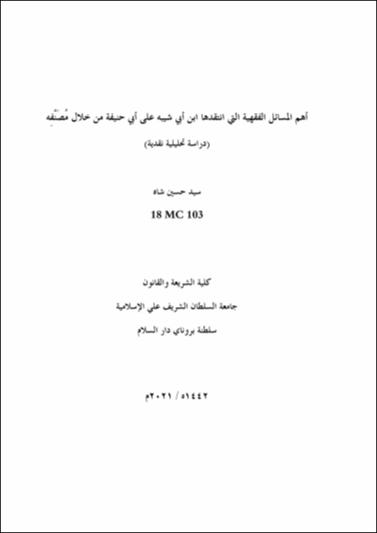Matters in Fiqh, in which ibn Abi Shaybah criticized Abu Hanifa, via a classified, analytical critical study
Abstract
The goal of this research is to collect the matters that Ibn Abi Shaybah criticized, claiming their violation of the prophetic sunnah, to order them under their corresponding Fiqh categories, and to conduct a thorough in-depth comparative fiqh study, as well as, discussing in Abi Shaybah's claim that Abu Hanifa violated the prophetic hadith. Furthermore, to uncover how the Hanafis deal with prophetic hadith. The problem of the research appears in the credibility of the criticisms Ibn Abi Shaybah has no Abu Hanifa's violation of saheeh prophetic ahadeeth, which could give those that are unfamiliar with the subject, the impression that Abu Hanifa preferred opinion over hadith. The researcher has used the methods of analyzing descriptions, where I began collecting the most notable fiqh matters of Abu Hanfia that ibn Abi Shaybah criticized from his book, (The Musannaf). I presented them, and then analyzed them until I reached the conclusion that Abu Hanifa did not in fact violate his madhab in prophetic hadith. The researcher also depends on past research papers and studies that are relevant to the subject. The results of the study conclude, that the science of hadith always depends on the passage, and doesn't go further than the passage, resorting to a conscientious opinion only when absolutely necessary. As stated by AbduAllah ibn Masoud - may Allah be pleased with him - founder of the school of R'ai (conscientious opinion) in al Kufa, since he was sent there by sayyiduna Umar ibn al Khattab may Allah be pleased with him - to be a teacher. There was, in the emergence of the Mutazilite groups and some other groups in the second century, a significant role in furthering the divide between the people of R'ai and the people of Hadith. As well as the bringing together of the two schools of (R'ai and Hadith) in the person of Imam al Shafi may Allah be pleased with him, where he was loved by the successors of all the schools of thought. The Hanafis did not partake in the practice of wiping over the headdress (umamah), for two reasons. First, because it is a single transmission that was relayed with the condition that it completely adheres to the book and it is impermissible in their school. Secondly, it is a singular narration that was revealed in regards to a matter, which through it, perpetuates general misconception. Therefore, it is not
accepted. Alas, it is revealed to us, that the claims made by Ibn Abi Shaybah on Abu Hanifa's violation of hadith (athar), are a matter that is unacceptable, for Abu Hanifa, brought together the references and did not transgress or violate them. Rather, he had in them his interpretations that are rooted in the linguistical and classical laws
Collections
- MASTER (FSL) [85]


